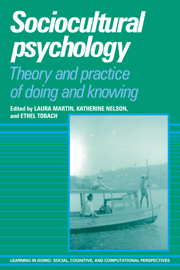Book contents
- Frontmatter
- Contents
- Series foreword
- Preface
- Contributors
- 1 Introduction
- Part I History and culture
- Part II Doing psychology
- Part IV Activity in work and school
- 13 The qualitative analysis of the development of a child's theoretical knowledge and thinking
- 14 Innovative organizational learning in medical and legal settings
- 15 Intellectual and manual labor: Implications for developmental theory
- 16 Visionary realism, lifespan discretionary time, and the evolving role of work
- Index
14 - Innovative organizational learning in medical and legal settings
Published online by Cambridge University Press: 05 November 2011
- Frontmatter
- Contents
- Series foreword
- Preface
- Contributors
- 1 Introduction
- Part I History and culture
- Part II Doing psychology
- Part IV Activity in work and school
- 13 The qualitative analysis of the development of a child's theoretical knowledge and thinking
- 14 Innovative organizational learning in medical and legal settings
- 15 Intellectual and manual labor: Implications for developmental theory
- 16 Visionary realism, lifespan discretionary time, and the evolving role of work
- Index
Summary
Organizational learning: Adaptation or creation
The notion of organizational learning has become a household term in literature on management and organizations (for reviews see e.g., Shrivastava 1983, Fiol & Lyles 1985). The notion holds two promises. First, it implies a departure from the individualism that dominates laboratory– and school-based theories of learning. Second, the notion of organizational learning is closely connected to notions of innovation and change, implying a departure from the obsession with reception, adaptation, and acquisition dominant in laboratory- and school-based theories of learning.
One source of the organizational learning literature comes from the idea of learning curves. During the life cycle of a certain production technology or product, firms are able to reduce their unit costs of production because of the experience gained by the workers in repeated cycles of production (Ghemawat 1985). This notion of organizational and technological learning assumes that learning occurs as a “natural” result of cumulated experience, as if automatically. The concrete mechanisms that lead to the observed reduction of unit costs have been largely neglected (Abernathy & Wayne 1974, Kibria & Tisdell 1985, Lilja 1989). Bell and Scott-Kemmis (1990) argue that the experiential learning curve approach is fundamentally flawed in that it ignores the continuous technological improvements and product innovations brought about by workers, managements, and clients. March, Sproull, and Tamuz (1991) point out another crucial problem: accumulation of experience cannot explain how organizations learn from unique events, or “samples of one or fewer.”
In their pioneering book, Argyris and Schon (1978) characterized organizational learning as error detection and error correction. Using Gregory Bateson's (1972) ideas as their springboard, they distinguished between single-loop learning and double-loop learning in organizations.
- Type
- Chapter
- Information
- Sociocultural PsychologyTheory and Practice of Doing and Knowing, pp. 326 - 356Publisher: Cambridge University PressPrint publication year: 1995
- 25
- Cited by



